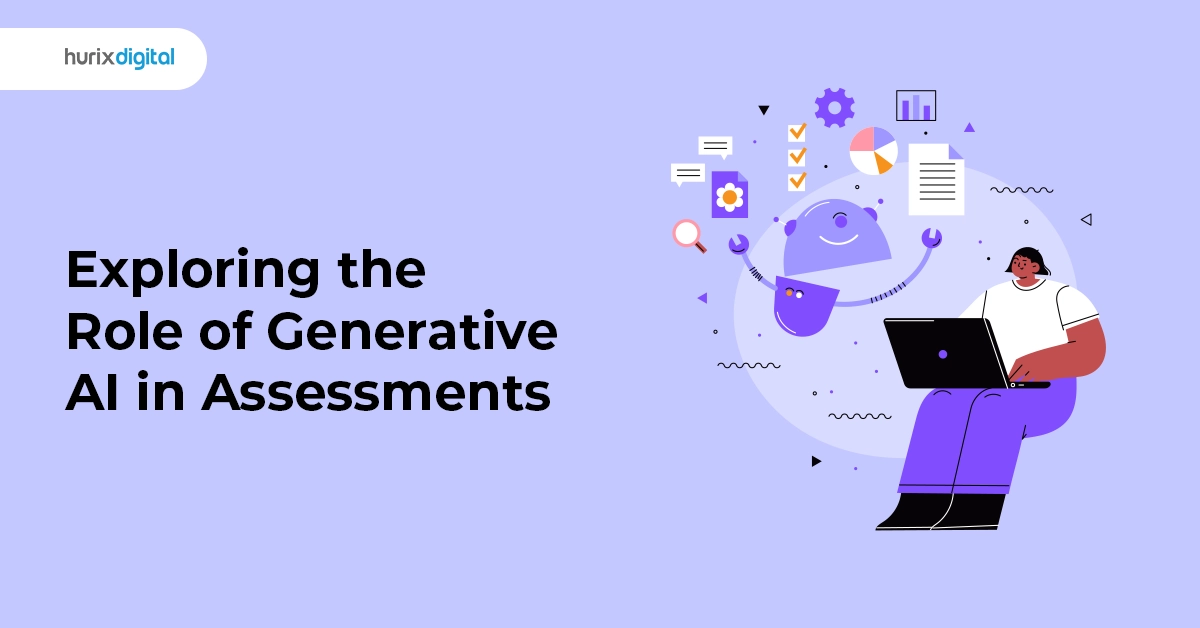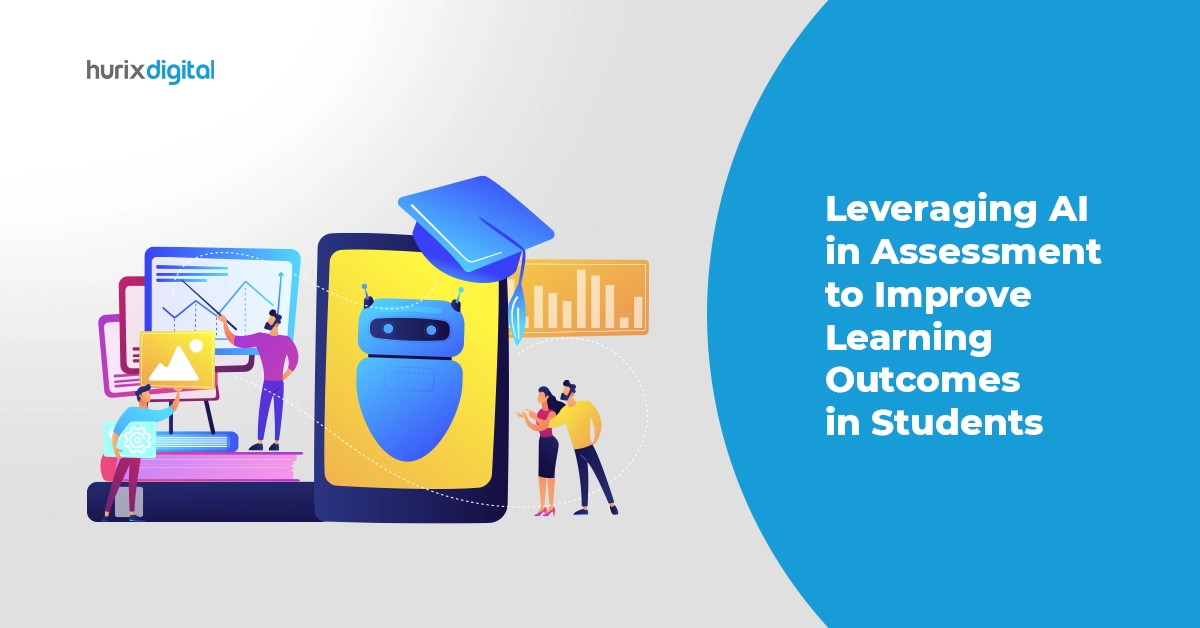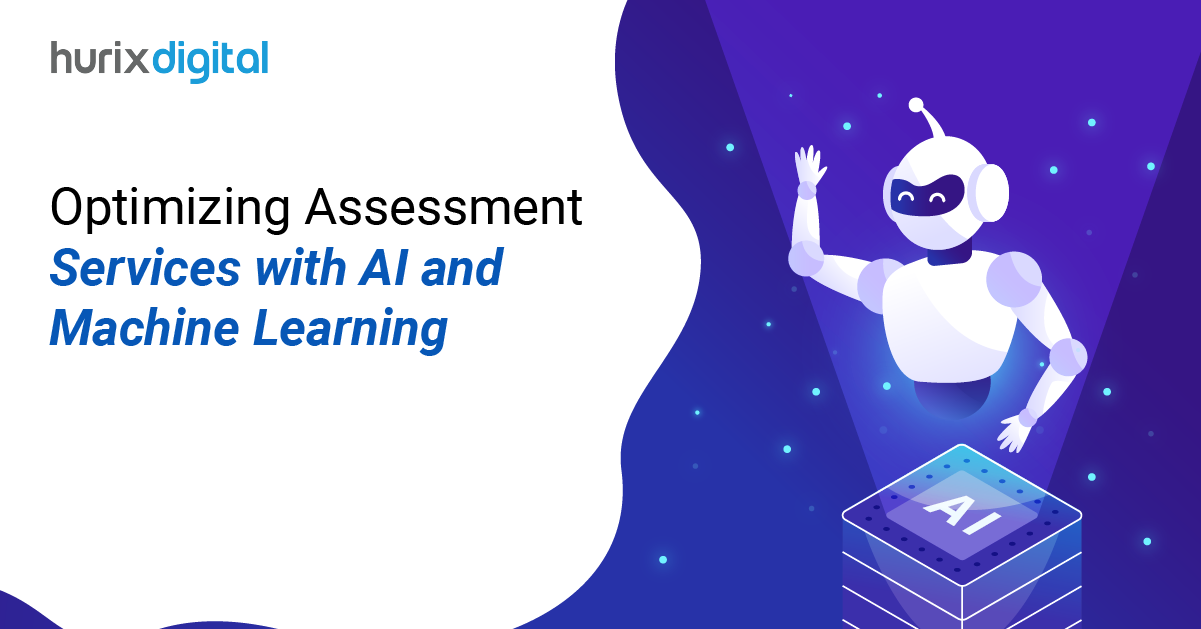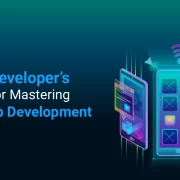
Exploring the Role of Generative AI in Assessments
With technology growing by leaps and bounds, generative AI has the potential to revolutionize the way universities evaluate student learning. Generative AI tools allow instructors to develop tailored assessments and scaffold learning.
On the flip side, students can misuse these tools of AI to shortcut valuable steps in the learning process. There are also concerns regarding integrity, authenticity, and bias in the use of these tools.
There is an ongoing debate about whether generative AI tools for students are game-changers or powerful tools that can be misused. Whichever side of the argument you are on, we can’t deny that the integration of generative AI tools in assessment has immense potential.
With the generative AI market expected to grow at a compound annual growth rate (CAGR) of 76.9%, the AI market in education is projected to reach a staggering $80 billion by 2032.
This article examines the possibilities generative AI unlocks and its impact on assessment, both for students and instructors. Let’s get started!
Table of Contents:
- What is Generative AI?
- Should Students Use Generative AI Tools in Assessments?
- The Benefits of Generative AI in Online Assessments
- Generative Artificial Intelligence & Academic Integrity Concerns
- Using Generative AI Tools to Create Personalized Assessments
- Generational AI-Assisted Grading – Is This the Future?
- Wrapping Up!
What is Generative AI?
Generative artificial intelligence (AI) is a type of AI technology that creates novel outputs or data by analyzing existing content. The input data can be in the form of animations, images, text, videos, code, or music.
AI-powered systems are trained on large amounts of data to learn from the structure and then replicate the pattern uniquely. Chat GPT is the most famous example here. The tool utilizes a Large Language Model (LLM), which was trained on tens of billions of words.
Being exposed to such vast textual data, the tool is now capable enough to write poems, have natural human-like conversations, and more.
Also Read: The Importance of Collaboration in Large-Scale Assessment Development
Should Students Use Generative AI Tools in Assessments?
The easy availability of AI tools gives rise to the burning issue that students will ‘outsource’ their assessment to AI. The use of generative AI in assessment does not naturally constitute academic misconduct.
Students must seek guidance from instructors on what is and is not acceptable. Below are three categories of AI use in assessment that can help students optimize- instead of damage- their learning.
1. Using AI as Primary Tools
Students can use generative AI tools to generate creative solutions, tackle complex problems, and make informed judgments.
Using AI tools as an integral part of the assessment allows them to demonstrate responsible and effective use of AI.
2. Using AI as Assistive Tools
Students can use AI tools for certain defined processes within the assessment, such as pattern recognition, data analysis, or generating insights.
Here, AI tools help enhance the development of specific skills, but their use is not in itself a learning outcome.
3. Inappropriate Use of AI Tools
The use of AI in assessments that require the demonstration of foundation-level skills is wholly inappropriate.
These skills might include remembering, understanding, applying knowledge, or independently developing critical thinking skills. Examples of such assessments include class tests, vivas, online tests, and more.
The Benefits of Generative AI in Online Assessments
In recent years, generative AI assessments online have emerged as a powerful force for change in education, enhancing traditional methods and providing flexible, personalized, and effective evaluation tools. As an instructor, embracing these advancements can offer a range of benefits that transform how you assess student performance. Understanding the advantages of AI-driven technologies helps you stay at the top of education innovation, providing students with fairer and more efficient evaluation methods.
1. Real-Time Feedback for Continuous Improvement
Feedback often arrives after an extended delay, potentially limiting its effectiveness. With generative AI assessment tools, students can receive instant results highlighting their strengths, identifying mistakes, and offering improvement tips. This feedback loop encourages continuous learning by allowing students to correct misconceptions and strengthen their knowledge in real time.
For instructors, generative AI’s instant feedback is invaluable for tracking each student’s progress. By accessing detailed insights provided by the AI reports, you can identify areas where students struggle and provide timely intervention, ultimately encouraging a supportive and healthy learning environment.
2. Efficient and Scalable Assessment Methods
In large classes or online courses with numerous students, manual grading can be time-consuming and prone to error. Generative AI in assessments online offers scalable solutions for grading, allowing you to evaluate hundreds or even thousands of responses quickly and efficiently.
By automating routine grading tasks, your instructors can focus more on quality tasks and assignments. Generative AI allows you to handle large volumes of assessment without compromising quality, making it an ideal choice for high-enrollment classes and online education platforms.
3. Reduction of Administrative Load
Another key benefit of generative AI assessments is the reduction of administrative burdens. The grading and evaluation process is often time-intensive, requiring instructors to invest considerable effort in manually reviewing student responses. You can significantly reduce the time spent on these tasks by leveraging generative AI assessment tools. Automated grading and feedback systems allow you to redirect time and energy toward curriculum development, student interaction, and classroom management.
This efficiency also benefits students, who receive quicker feedback and results. Reduced administrative load enables faster grading and reporting, ensuring students don’t experience longer waiting times for assessment results.
Embracing generative AI assessment tools equips you to provide a more accurate, efficient, and supportive evaluation experience for your students. By upgrading accessibility, promoting academic integrity, and offering data-driven insights, generative AI is transforming how education assesses and supports student learning.
Generative Artificial Intelligence & Academic Integrity Concerns
Generative AI tools have the potential to generate outputs that are academic in writing style, grammatically correct, and highly relevant to the stimulus question.
Misuse of these tools in assessment is considered plagiarism or falsification. This poses a serious threat to educators seeking to safeguard academic integrity.
1. Challenges for Instructors
- Difficulty in differentiating between human-generated and AI-generated content. This threatens academic integrity in all disciplines, especially computational and text-based assignments.
- Students can learn generative AI and use it to take ‘shortcuts’ with assessments. For instance, they can jump straight to the output without developing ‘thought ownership.’
- Blurred lines between fraud, plagiarism, and cheating. Students might be involved in the fraudulent use of AI-generated content and present it as their work.
2. Championing Academic Integrity in Assessment Design
- Instructors can use forms of assessment that demonstrate thought ownership. These include oral assignments, interviews, or presentations.
- They can adapt or revise assessments to support greater ownership or personalization.
- Instructors can ask students to submit evidence of process development.
Using Generative AI Tools to Create Personalized Assessments
Personalized learning revealed the cons of “one-size-fits-all” teaching methodology, and the same holds good for assessment as well. Every student has a varied skill level and aptitude. Assessments should take cognizance of the same to evaluate each student’s skill fairly.
Conventional assessments fail to accurately test student knowledge as they’re not tailored to individual student learning outcomes. With generative AI, instructors can generate adaptive assessments that are personalized to each student’s level of understanding.
Generative AI algorithms adjust the difficulty of subsequent questions by analyzing data on students’ responses. This ensures that every student is appropriately challenged and accurately assessed without wasting time on materials that students already know.
In the future, assessments will automatically evolve to match the specific student’s capabilities as generative AI tends to learn and get better over time.
Also Read: AI-Enabled Assessment: Redefining Evaluation in Education
Generational AI-Assisted Grading – Is This the Future?
Generative AI tools learn from data, which means they can be trained to comprehend specific grading criteria. They can effectively mark students’ work based on this comprehension.
Auto-marking through generative AI is an impartial, efficient, and reliable way of grading assessments. It eliminates the downsides of manual grading: biases, inconsistencies, and errors.
By using the capabilities of generative AI, instructors can save time and effort on administrative tasks. They focus more on student interaction and personalized teaching. This improved validation of assessments paints a more accurate picture of learning outcomes, enabling instructors to make better-informed teaching decisions.
Adopting generative AI for auto-grading assessments offers various benefits to students as well. The most significant advantages include accurate and immediate feedback on their performance.
With the constant advancement in generative AI research, there is immense potential for more sophisticated auto-grading algorithms.
Wrapping Up!
Keeping generative AI and inclusive and ethical assessment practices in mind, educators need to rethink their approaches to assessments. With the right approach, they can harness the power of this technology and get ready for the future of assessments.
With careful usage and human oversight, instructors can empower students with the necessary skills to leverage generative AI for their learning and lifelong success.
If you want to optimize your student assessment platform with the smart use of generative AI, automation, and machine learning, Hurix Digital can be your digital transformation partner! Whether you want to scale, improve performance, or optimize costs, our team of experts can help you meet all your requirements. To learn more about our services, schedule a demo with us today!

Vice President – Digital Content Transformation. He is PMP, CSM, and CPACC certified and has 20+ years of experience in Project Management, Delivery Management, and managing the Offshore Development Centre (ODC).





